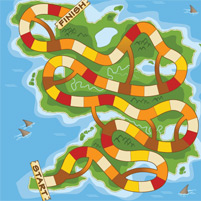Counting Counts

Teachers and parents like to use board games to teach skills that range from fair play to counting.
But, when it comes to improving early number skills, a study by Carnegie Mellon University and Boston College researchers finds that how children count is what really counts.
Games such as Chutes & Ladders require players to count out the spaces as they move their tokens. Earlier studies have pointed to the benefits to young children of playing games that require counting.
Published in "Developmental Psychology," the study shows that numerical board games can be beneficial for learning the full range of numbers from 1–100, and extends previous studies that showed the benefits of playing board games to learn numbers from the 1–10 range. It also found that how the children count while they play is crucial.
"This study is important because it shows that parents can increase their children's learning if they make a small change in the way that they play common number board games with them," said Robert Siegler, the Teresa Heinz Professor of Cognitive Psychology at CMU who has demonstrated a variety of positive effects of playing numerical board games with young children.
The findings were published shortly after CMU launched the Simon Initiative to accelerate the use of learning science and technology to improve student learning. Named to honor the work of the late Nobel Laureate and CMU Professor Herbert Simon, the initiative will harness CMU's decades of learning data and research to improve educational outcomes for students everywhere.
The researchers tested two counting methods in a study of 40 children who played a 100-space board game designed by the researchers to mimic products like Chutes & Ladders. In the first method, referred to as "count-from-1," children started counting from the number one each time they moved a piece. In the other method, students would "count-on" from their latest landing spot in the game. So a child who had moved her piece 15 spaces would "count-on" beginning with 16 during her next move.
The process of counting-on allows children to develop their ability to encode the relationship between numbers and spaces. That, in turn, improved their abilities to estimate the size of numbers on number lines, identify numbers and to count-on.
Playing the same game, the standard "count-from-1" method led to considerably less learning, the researchers found.
In a second experiment, the researchers found that students who practiced encoding numbers 1 through 100 via methods beyond a board game showed no appreciable gain in number line estimation.
"Board games help children understand the magnitude of numbers by improving their abilities to estimate, to count and to identify numbers," said Elida Laski, assistant professor of education at Boston College. "But the benefits depend on how children count during the game. By counting-on, parents and their children can see some real benefits from board games. It's a simple way to enhance any game they have at home and still have fun playing it."
Related Links: Simon Initiative | Dept of Psychology
